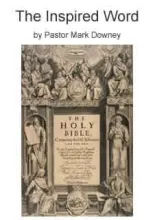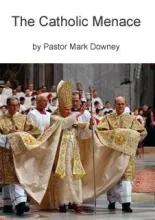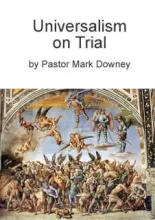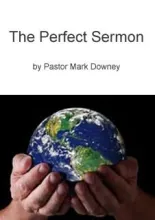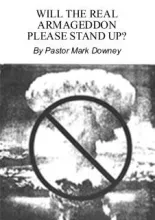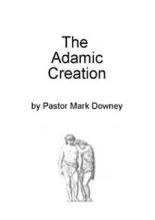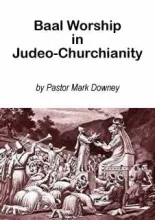The Sabbath
by Pastor Mark Downey
A question which agitates the Christian Identity community is: what day is the Sabbath? Some say Sunday is based on sun worship, while others say Saturday derives from Saturn. So begins long, drawn out controversies of pagan origins vs. "Thus sayeth the LORD." The point of the Sabbath is missed by the arguers, good Christians that they may be. I believe this issue has been used as a wedge to sow discord among the brethren. We had a guest visit our church once, a libertarian CI, who never came back, not because of lack of fellowship or worship, but because he was adamant about Saturday being the day.
We observe Sunday, not as a matter of dogmatic doctrine, but because it has been the traditional day for a long, long time. "The children of Israel shall keep the Sabbath, to observe throughout their generations, for it is a perpetual covenant. It is a sign between Me and the children of Israel" Ex. 31:16. For the record, and not to denigrate our own kinsmen, it's a fact that jews observe Saturday. They either have it right or that is the "sign" they have chosen for themselves to distinguish themselves from Christianity.
In response to the sun/Sunday connection, may I remind you of the scripture, "But unto you that fear My name shall the sun of righteousness arise with healing in His wings" Malachi 4:2. The sun also provides light to our planet earth. Without light there is no life. Jesus said, "I am the light of the world" John 8:12.
Just as a side note, it is interesting American history to know that at the turn of the century in New York City, jews began violating the Sunday blue laws of not conducting business. Parenthetically, it was at this same period of time that the floodgates of non-White immigration began to open. This day of rest soon became another day of business. We can see the fruits of this subterfuge 100 years later with the TGIF mentality for a fun-filled party weekend. Oh, people might make a guest appearance at a church twice a year on Easter and Christmas, but it isn't like it used to be. The actual day of the "true" Sabbath is the least of our worries. One out of seven is the point and principle.
When I recently said that to someone, he replied, "Well, I wouldn't go quite that far. It does incur the death penalty after all. It is however one of the more difficult Laws to follow in modern Babylon." Perhaps he misunderstood what I meant. I did not say that we shouldn't keep the Sabbath, whereby the death penalty pertains. Do you really think God will judge us as a matter of capital punishment if we miss the Sabbath by one day (keeping in mind that His mercy endureth forever)?
The reason I gave the anecdote about New York City taking the lead in not keeping the Christian Sabbath is that we are not the same blessed nation that we were when we did keep the Sunday worship. The Law of God is not difficult to follow at all if the intent is to do our best to keep it. A rebellious spirit who willingly disobeys and defies God is quite another matter and will incur the wrath of God as sure as the sun shines. "Come out of her [Babylon] My people" means 'deny your selfishness and take up your Cross and follow Christ'. What we should worry about is the blindness that is still upon our people, who are happy as clams with their heads in the proverbial sand, regardless of which day they keep or don't keep. Israel is indeed lost to their identity and duties.
I think what has happened with this issue and why it has become such a contention for some, is that there is a difference between the spirit of the law and the letter of the law. What happens when we start doing greater works than the healings of Jesus on the Sabbath? Will the modern Pharisee point the finger of blasphemy at the Christian as they did with Christ? It has been my casual observation that we have so many conflicts of interest; not because somebody has sinned, but rather that somebody isn't living the same kind of lifestyle as another. It doesn't bother me if a brother or sister worships on Saturday or Monday, as long as he or she has a day of rest and can dedicate some special time for the Lord (above and beyond the other six days of the week). I think that was the intent of the Law. By the same token, those of us who keep Sunday as our Sabbath day of rest, worship and fellowship should not be castigated to hellfire and brimstone for doing so.
There are other Sabbath cycles that work on the same numerical principle. If we have lost track of the Jubilees, we should know when 49 years have expired to release a debt. It doesn't require a debate or a calculator to determine exactly which year it is. The ole axiom applies: just do it!
Just to digress for a moment, it is the bickering over things like the Sabbath that turn people away from their calling. If people are told they are not a Christian unless they believe the Sabbath is on a certain day, they have been robbed of making the decision for themselves. That's why I'm not dogmatic on this subject. I can present all the options out there for them to choose from and still fellowship with them, without excommunicating them before they've decided to respond to their calling from God. I think it is I Thes. 5:19, quenching or extinguishing the spirit that we should be watchful of.
Many do not like the idea of Christianity sticking its nose into politics and cry 'separation of church and state'. The reality is, however, that if the idolatry of the land is the law of the land, then it is really a separation of God from government. We are told to seek FIRST the Kingdom of God. This has everything to do with political power and our calling.
What does the aforementioned have to do with the Sabbath? Well, it's become controversial because of so many interpretations as to what we are supposed to do. I can count at least half a dozen such subjects that will keep our people arguing ad infinitum, never realizing a power base within Babylon. I have noticed this tactic being employed over the years by self-aggrandizing ministries and people who get caught up in the whirlwind of what constitutes a Christian, and it has been very damaging to the body politic. Why? Because of idolatries, not of wood or stone, but of heart and mind. A false teaching and an ungodly spirit can be just as much an idol as any carved figure.
We all want to place our faith in the Truth, however the Truth has sometimes been manipulated into a theological football. According to Scripture, this should not be. And it explains why we are so riddled with divisions: someone wants to quench another's spirit by accusing them of not being a Christian. There are only a few fundamentals that would force me to accuse someone of not being a Christian and they all have to do with Jesus Christ, not the particulars of the calendar, or the pronunciation of sacred names, or how wet someone has to get to be baptized, etc.
We should understand this about our fellow believers: we are all at different levels of growth in our walk with Christ. The Lord gave us these sowers of seed, fishers of men, pastors etc., with spiritual enablements to serve the will of God. In this regard we are as powerless to choose our calling as was Jonah. God's purpose is to build the body politic, knowing that there would be "deceitful workers and.... servants disguising themselves" as righteous men. Ephesians 4:13 emphasizes the unity of our mutual faith in Jesus Christ and our knowledge of Him as we mature "to the measure of the stature" which belongs to the fullness of Christ. In other words, man cannot measure what belongs to Christ. "So that we are no longer without forethought, being blown about and being carried by every wind of teaching, in the deceitful trickery of men, in dishonestly having no principles, on the side of the system of error; but speaking the truth in love, we may grow up into Him in all things" Eph. 4:14-15. This is how we are supposed to deal with controversy.
If there is no biblical principle in Christian discourse or discussion, it usually winds up with fragmented resentments and a grab for power that God has not ordained. How can the Truth be spoken of in any other way than in love? Maturing in Christ is progressive from each individual member of the body. It is the body politic of Christians being fitted together and brought together, with every joint and ligament supplying an assistance towards the measured growth of the unity of the whole itself (in love). The muscle of our faith is the momentum of our Movement. We move forward collectively. A disjointed body is crippled and cannot make progress.
When we finally get our act together, we just might get somewhere; somewhere out of the spiritual rut that we find ourselves in today. "For this is the love of God: that we keep His commandments and His commandments are not grievous. For whatsoever is born of God overcometh the world; and this is the victory that overcometh the world, even our faith" I John 5:3-4.
I was fortunate enough, several years ago, to make the acquaintance of the late Pastor Curtis Clair Ewing, a contemporary of Howard Rand, Robert Record and other earlier CI Bible scholars. Pastor Ewing wrote a 74 page tract entitled "Israel's Calendar and the True Sabbath"; in which he stated that the days were not named, but were fixed days of the month. As such, the system is lost to antiquity. Even if one were to rediscover the particulars, one would have to change the system. The bumper sticker that says "The Gene Pool Needs Chlorine" comes to mind.
We know that there were certain changes nailed to the Cross with the advent of Christ. The temple ordinance of the Sabbath was foretold by God that He was going to bring it to an end (Hosea 2:11) and 785 years later it did. Ewing makes the point that Christ established the new day of rest and therefore, that is our standard.
The word Sabbath means rest and is not an alternative word for Saturday or Sunday. Contrary to the claims of some, it does not mean seventh. The Moral Law as summarized in the 10 Commandments tells us to, "Remember the Sabbath day", not the "seventh day." Some absolute calendar day corresponding to a standardized way of marking off a week is not the essential moral issue as the inspired word states it. Sabbath keeping, as with all Moral Law, did not begin at Sinai. It was recognized from the time of pre-Fall Eden throughout all of biblical history. To show how important it is, God put the Creation Sabbath law into covenant form at Sinai, and included it with His summary of the other commandments that together summarize the principles of moral law.
One day in seven is designated by God for a Sabbath as a creation ordinance. In the time before Christ, that day is to follow six days of labor. The intent of this rest was to show our commitment to set ourselves apart from the world, thereby receiving the blessings of our Lord. Making a particular day of the week an issue for being obedient to God, misses the biblical intent and principle. The principle was/is to be on a national level. As I mentioned earlier, the old Sunday blue laws can show a discernible loss of blessings, just as it has been proven that education went sour when they took prayer out of the schools. It's just a matter of divine cause and effect. Jesus denied that He came to abolish or to destroy any part of the Law or the words of the prophets. He came instead to bring them to their full measure. As the application of that principle is seen throughout the New Testament, it becomes clear that the ceremonial law was added to foretell the coming of Jesus, as the Lamb of God, and was completed at the Cross and thus finished as to its purpose. A sign of something to come is no longer needed once that to which it points has arrived. But the moral principles installed in Creation to declare the holiness and nature of God were not set aside, nor could they be without violating their purpose. In each text that speaks of Sabbath in the New Testament, we must first determine if it is speaking of the Creation Sabbath, which was prior to Moses, or of the Levitical Sabbaths added at the time of Moses to prefigure the coming of the Messiah.
God's work of Creation established the seven-day cycle. The Sabbath Day was a memorial binding upon Adam. The Bible clearly teaches that this obligation is perpetual. Later, when the Law was revealed to Israel by Moses, other uses of the Sabbath principle were imposed to foretell the redemptive work of the Messiah. Therefore we ought to recognize two separate levels of law included in the Sabbath principle at the time of Christ:
- The Sabbath of Adamic Creation: binding perpetually upon mankind
- The Sabbaths of the Levitical Priesthood : binding upon Israel until their fulfillment in Christ
Moral law is characterized by particular properties which help us to categorize the principles revealed in Scripture such as the various levels of Sabbath law. They are as follows:
- Since the moral principles derive from the nature of the Creator, it is not possible for these principles to be variable or optional in a creation intended to declare the Creator's glory, eternal power and divine nature. Therefore we say that the moral laws are each necessary and cannot be abrogated without confusing or denying aspects of God's nature.
- Since the nature of God is eternal and unchangeable, so also must the moral principles of His Creation be perpetually binding.
- Since God made all of Creation to declare His glory, which includes His holiness and justice, therefore God makes known His moral principles obligating all moral creatures to obey them perfectly and personally.
Considering these properties, it will become evident by the details given in God's Word that the Creation Sabbath fits the category of Moral Law, and the Levitical Sabbaths do not. They fit into the category of Ceremonial Law, which was nailed to the Cross.
The Creation Sabbath is primarily related to the work of bringing the physical universe into being. Since all living beings owe their existence to that event, and since this was given prior to the Fall of man into sin, this day was set aside as special for all time. It has no specific redemptive element, though it lays the foundation for the means of salvation by establishing the Sovereign authority of God over all He made. Genesis records the introduction of Sabbath to the representative head of mankind in Eden: Genesis 2:1-3.
It represents God's ceasing from His work of creating all things out of nothing. The main element was not rest and recuperation, since God needed none. The rest is that of ceasing from what He had been doing. Therefore the primary focus of the Creation Sabbath is ceasing from our labors and a remembering of the Sovereign Creatorship of God to whom all glory belongs. This makes it a perpetual day of worship, as long as the created heavens and earth remain. Therefore it is moral in its nature.
The Levitical Sabbaths were made binding upon Israel after the exodus as part of the system later abrogated by Christ. That system of symbols, ceremonies and sacrifices were instituted to reveal the redemption Christ would accomplish and the benefits of that redemption. These Levitical Sabbaths commemorated the rest granted to Israel upon its deliverance from Egypt and foreshadowed the rest promised in the land pledged to Abraham, Isaac and Jacob. They also marked out Israel from the nations as a covenant community by the special requirements they made upon their culture and calendar.
They began in the deliverance from Egypt and were layered upon the moral principle given at Creation rather than being an essential part of it. The rest promised was essentially fulfilled in the finished work of Christ. Therefore these special days, like the other special feast days established under Moses, have no place in the Christian era that followed the Ascension.
Since the Sabbaths of the Levitical period deal with redemption from sin, they are only moral in the sense of revealing God's grace and justice during a particular time segment of history and are therefore not moral in nature, but are better categorized as ceremonial law.
According to Ewing, if it can be shown that through Christ, Sunday became recognized as the Sabbath, we only need to know when that first Sunday Sabbath was. It began on the day of the Resurrection and that should be the focus of one's study (Mt. 28:1). The 4th chapter of Hebrews speaks of a better rest for the believer, of which God's creation-rest is the type. It is the unbelief in Christ's work (as it was in the Wilderness), that they will not enter into His rest. Ewing proceeds to show that the day of Resurrection is the Lord's Day, the first day of the week, Sunday, and this is the day John was speaking about in Rev. 1:10. Our body needs it, our soul needs it, our spirit needs it and God commands it. The choice is not in what day (personally decided upon), but in resting from our labors. If we had a national consensus or plebiscite (as the old blue laws), our cup would runneth over with blessings and we would no longer be at the mercy of personal decisions. That is the greater impact we must realize as Christians. In all of this there are a jewish troublemakers lurking somewhere in the shadows (every day of the week). Christian Identity can take the lead by promoting the necessary and biblically prescribed ethnic and moral cleansing to make the Sabbath day holy.
It has also been pointed out to me after I asked: "What are the basics of this subject? Do we keep a specific day or do we rest? Which principle reflects the will of God?" Why would they be exclusive of each other? Surely we could rest on a specific day?
They would be exclusive because there isn't any unity on the subject (at this point in time). It goes to the heart of intent. Is God's will for us to keep the letter of the law or the spirit of the law? The letter of the law would deal with specifying what day. The spirit of the law would be to rest your body, soul and spirit. If we, as Israel, were to act in unison on a national basis as the body of Christ, on a specified day to rest, would it make any difference which day it is? I would say sure, because we have recent history as a model, and we would know in short order if we were being blessed or cursed. I might add that national repentance would go a long way in that regard also. If we, as individuals, are earnestly trying to obey God in this matter, does it make any difference which day it is? I would say no, because it's not for us to judge each other over this subject. Let's face it; we are in a pathetic state of affairs! Who is going to call it sin and cast the first stone? Who is going to drag me and my congregation out of our Communion service on a Sunday down to the local stoning pit? "Let no man therefore judge you in regard to… a Sabbath day" Col. 2:16.
We could rest on a specified day, but the reality is that there is too much of a divergence of opinion at this point in time to specify what day that would be. So the next best thing for us to do is to calmly respect the opposing view if there is no discernible sin. For those that are all-too-ready to accuse, keep in mind the certainty of Mt. 7:1-2, "Judge not, that ye be not judged. For with what judgment ye judge, ye shall be judged, and with what measure ye mete, it shall be measured to you again." We are told that we are to be overcomers and so we should overcome this issue as brethren and not as adversaries. The same can be said with all the other doctrines that impede our advancement of the Kingdom. It is especially true that Israel has everything to do with the Sabbath issue. Until we, the White race, deal with the alien strangers on our hallowed ground, our national institutions, our Beulah land, the Sabbath issue will be superficial by default (defilement of hallowed ground).
What I'm saying is that the literalist, legalistic, pharisaic mindset to observe a point in time is not as important as our justification in Christ and Christ as our personal rest. Nationally and corporately as the body of Christ, the Sabbath or Lord's Day is Sunday. From the Westminster Confession of Faith we read, "21:7 VII. As it is the law of nature, that, in general, a due proportion of time be set apart for the worship of God; so, in His Word, by a positive, moral, and perpetual commandment binding all men in all ages, He hath particularly appointed one day in seven, for a Sabbath, to be kept holy unto Him: which, from the beginning of the world to the resurrection of Christ, was the last day of the week; and, from the resurrection of Christ, was changed into the first day of the week, which, in Scripture, is called the Lord's day, and is to be continued to the end of the world, as the Christian Sabbath."
The Creation Sabbath is but one kind of Sabbath. But it is also consistent with the fact that in the Levitical set of laws there are many different Sabbaths. While the Scriptures are our only authoritative word concerning the proper keeping of Sabbath, subsequent records show that the church kept the Creation Sabbath throughout the major periods of its history. Only in recent times have some churches actually championed the open rejection of the fourth commandment. Prior to that revolting development, people were merely quibbling over Saturday or Sunday. While the practices and interpretations of law have varied, the Sabbath has been honored by the church in the time of the early church fathers, the Roman Period, the time of the Reformation, the era of Puritans and Separatists in England, and all who have adhered to a complete and inerrant Scripture.
We are set free from the imposition of man made limits. Fallen hearts look to such things as if somehow they could make us more holy or draw us closer to God. Superstition was an element of the fallen nature and it drives people to abstain from good things thinking they will be better for it. And they judge those who don't abstain as their inferiors. This has no place in the believer's life. They also condemned those who did not keep their strict calendar which no longer had meaning since what it represented had now been completed on the Cross. There is only one perpetual holy day set aside by God. The weekly Sabbath was sanctified from the time of creation. God never promised that we would be set at liberty from his moral law.
Though God's moral principles are unchanging, they must be applied to changing needs. The most significant act of God toward man after His Creation was the redemptive work of Jesus Christ. While that didn't free man from his duty of remembering God's Creation, it did affect the way that law was applied to the circumstances of God's unfolding plan. At the root of the creation ordinance of Sabbath is the duty to labor for six consecutive days, then to cease labor for a full day of remembering God's work and glory. Within the context of changing circumstances, there is an unavoidable detail that must be agreed upon. We must know which of the seven days is to mark the beginning of the work week. Before the atonement of Christ, the covenant people of God were told to keep the Sabbath on the seventh day of the labor cycle. The post-resurrection church keeps the Sabbath on the first day of the labor cycle. This is a circumstantial change only. It does not reflect a modification of the moral principle itself.
God's Word gives no indication about an absolute solar or lunar day on which the weekly Sabbath should fall. Its association with Saturday, (or more accurately Friday sunset to Saturday sunset, considering that the sun starts to set right after high noon), is more of a circumstantial artifact of the calendars in use by the Roman Empire and the Jews of that same period, than any moral principle laid down at Creation. What is clearly evident in the moral part of the law is a cycle of six work days followed by a seventh day of rest. This basic fact is undisputed. The day of the week, as our modern calendars define it, is not the essential moral issue. One day in seven is designated by God for Sabbath as a Creation statute.
Exodus 20:11 makes it clear that the weekly Sabbath before the Cross was set to what they then understood as the seventh day after the six-day work cycle. It was tied to Creation. In Deuteronomy we have the covenant form of the law. There Moses gives the deliverance from Egypt in the Exodus as a reason for Sabbath. This redemptive idea is tied to the Levitical period only, where restorative symbols abounded.
The church after Pentecost (Acts 2) began to keep Sabbath on the first day of the week to commemorate Jesus' resurrection on the first day, Sunday. The day of Jesus' resurrection was very important. All four gospels record that this took place on the first day of the week (Mt. 28:1, Mark 16:2, Luke 24:1, John 20:1, 19). His resurrection was the turning point of all history. It marked the end of the Levitical symbols of expectation, and the beginning of the era of fulfillment when the things promised became facts of history. It took an event as great as Creation itself to make the circumstantial change in the day of Sabbath sanctification.
By our Lord's completing of the temporary redemptive laws, the old calendar set by God for the era of Mosaic practices was set aside. The variable calendar was no longer needed and the day of ceasing could, for the first time since Sinai, be set to a fixed rotation of days with no 48-hour Sabbath to move it each year. The references to the worship of the New Testament church show that the Apostles directed the early church to make this change from the seventh day following labor to the first day of the week tied to the new Roman calendar. Acts 20:7 tells us, "Upon the first day of the week, when the disciples came together to break bread". and in 1 Corinthians 16:2 ... "On the first day of every week let each one of you put aside and save, as he may prosper, that no collections be made when I come"; and in Revelation 1:10, "I was in the spirit on the Lord's Day." The phrase "on the Lord's Day" is based upon the idea expressed throughout the Old Testament where the Sabbath is referred to as a day belonging to the Lord.
The earliest records of the church confirm that the Lord's Day, or "Christian Sabbath" was kept faithfully by the church on the first day of the week in remembrance of the Lord's resurrection. The views of the earliest teachers in the church show us how the apostolic teachings were being implemented at that time. What we find is consistent with what we see in the New Testament record.
Ignatius of Antioch (known as a personal friend of the Apostles) said, Christians "no longer observing the seventh day, but living in the observance of the Lord's Day, on which also our life has sprung up again, by Him and by His death." Justin Martyr said, "On the day called Sunday is an assembly of all who live either in cities or in rural districts ... because Jesus Christ our Savior rose from the dead upon it."
Unfortunately, our race and our CI faith, in particular, are at an impasse over so many of these "religious" topics. We have failed to meet the commands for unity in the body of Christ. There are prerequisites that will heal us from the curses of division, but that is another sermon. Before we can practice our faith together, we need warm bodies, as in a plurality of people committing themselves to weekly worship and fellowship. The greatest tragedy within our Movement is the plurality of lone wolves. There is a problem of proximity to like-minded people, but there is also the problem of pride that prevents our posterity from prospering. If we could give the next generation of CI, at the very least, the means to effective fellowship and worshipping together, that, in itself, would be a major accomplishment. If Sunday is to be a litmus test for unity, let it begin with two or three gathered together in the name of Jesus Christ and there He will be in the midst of them. God bless all of the microscopic congregations out there, that yearn for the manifestation of the sons of God Almighty.
- Log in to post comments

 "For thou art an holy people unto the Lord thy God: the Lord thy God hath chosen thee to be a special people unto himself, above all people that are upon the face of the earth."Deuteronomy 7:6
"For thou art an holy people unto the Lord thy God: the Lord thy God hath chosen thee to be a special people unto himself, above all people that are upon the face of the earth."Deuteronomy 7:6
